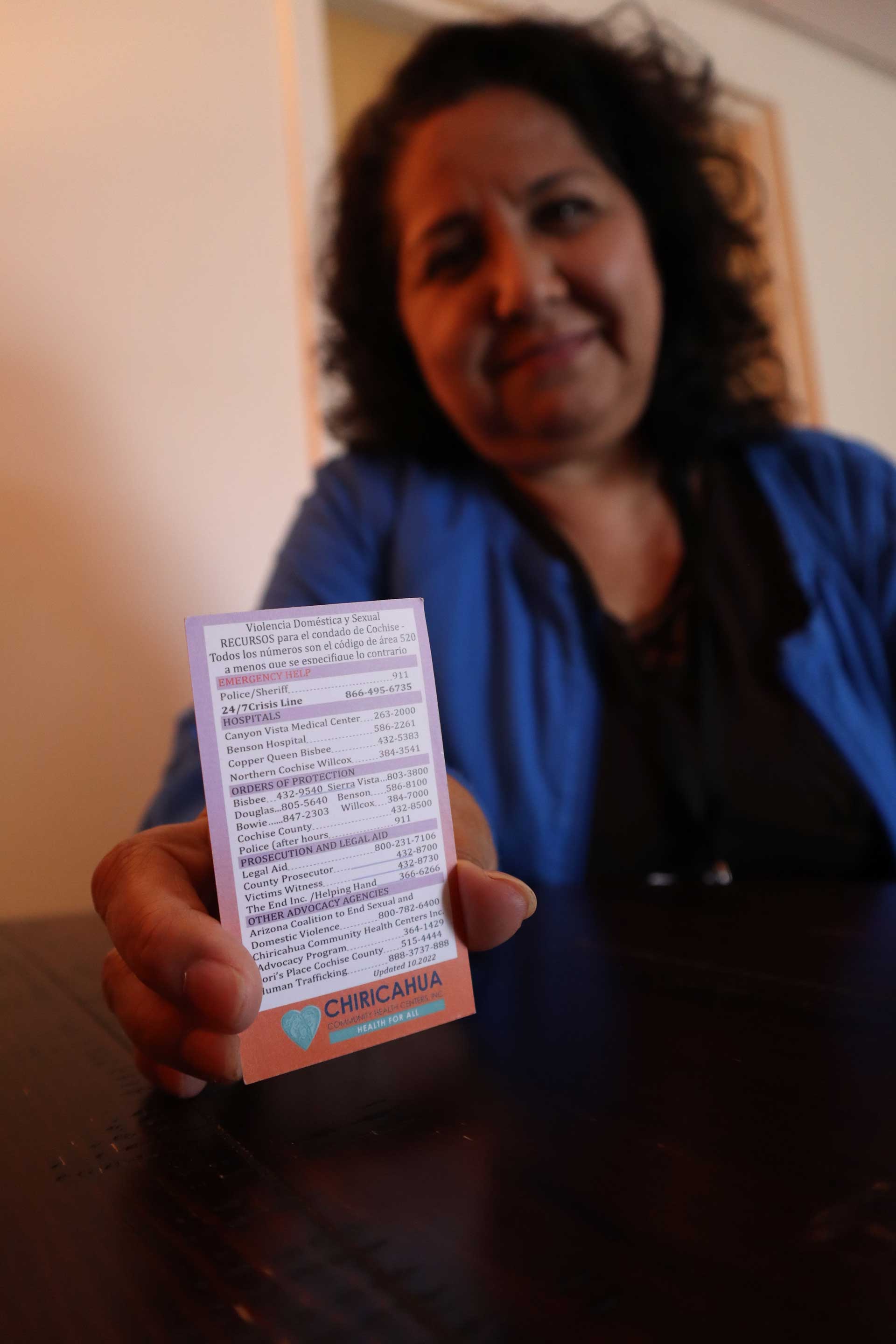 VIEW LARGER Chiricahua Community Health Centers Domestic Violence & Sexual Assault Program Supervisor Rosie Mendoza Chapa, who has made it her mission to help educate youth about domestic violence since Chiricahua Community Health Centers launched its program in 2008. She holds a shoe card, which contains resources for victims to get help while being able to discretely hide the card in their shoe. July 12, 2023. Photo by Summer Hom, AZPM News.
VIEW LARGER Chiricahua Community Health Centers Domestic Violence & Sexual Assault Program Supervisor Rosie Mendoza Chapa, who has made it her mission to help educate youth about domestic violence since Chiricahua Community Health Centers launched its program in 2008. She holds a shoe card, which contains resources for victims to get help while being able to discretely hide the card in their shoe. July 12, 2023. Photo by Summer Hom, AZPM News.
Arizona has one of the highest rates of domestic violence in the United States, according to domesticviolence.org, a non-governmental organization that aims to provide information to survivors of domestic violence.
A program started by Chiricahua Community Health Centers in Cochise County aims to educate youth about the warning signs to prevent abuse before it starts.
“The most dangerous time for a victim is when they want to leave, when they look for resources when they look for help,” said Rosie Mendoza Chapa.
She has made it her mission to help educate youth about domestic violence since Chiricahua Community Health Centers launched its Domestic Violence & Sexual Assault Program in 2008. Mendoza Chapa is now the program’s supervisor. She’s also a domestic abuse survivor.
"Being a survivor makes you think about other people, ‘cause you’re not the only one," said Mendoza Chapa. "It happened to many women, and men too. They’re finally speaking up. And I help women to get out of the situation, but I care more about the children. I’m sorry, but the children, they don’t have a choice. And they are growing in that environment, and I always think about them because they are the ones that are going to keep doing it, or become victims."
She said the program at Chiricahua initially got its funding from the U.S. Department of Justice and from the Violence Against Women Act, which allocated funds for community health centers like Chiricahua.
“Because studies were showing that victims come to the clinics," Mendoza Chapa said. "If they don’t come for the help, they come to bring the children.”
The pattern provides an opportunity for intervention. She said Chiricahua’s program aims to both train clinicians to help domestic abuse victims and to educate the youth in middle and high schools in Cochise County about domestic abuse. She started giving those presentations to students in 2015 at Douglas High School.
“We already had two shelters in Cochise County back then. But nobody has really been working on educating," said Mendoza Chapa. "Education is prevention ... This can happen to you. That’s the first thing. Second thing: I don’t want you in jail. I don’t want you with a record of domestic violence. Think about it, it's a crime.
Because It’s true, a lot of people grew up in domestic violence and they saw that — day by day," Mendoza Chapa continued. "So, it’s in your mind, it’s what you want to do. And I have this boy at one of the high schools … He would say it ‘okay doñita — m’am — I’ve seen my grandfather hitting my grandmother, I’ve seen my uncle hitting my aunt, my dad hitting my mom. So, that’s what I learned to do. How can I change it?’ I was speechless. How can I answer that? So something comes to my mind and I say ‘okay, what is your dad doing for work? … He makes tortillas."
Mendoza Chapa said she then asked this student if he also wanted to make tortillas for a living.
“And he immediately said ‘Oh, heck no,’" Mendoza Chapa recalled. "Ah really? You can choose.”
The National Coalition Against Domestic Violence reports that across the U.S., on average around 20 people per minute are physically abused by an intimate partner.
The Arizona Coalition to End Sexual and Domestic Violence’s 2022 fatality report shows 101 people in Arizona died from domestic violence last year. Out of 80 perpetrators of domestic violence, 69 of them were men and 11 were women.
As to why those numbers and percentages are so high, Mendoza Chapa believes one reason could be the limited scope of mandatory reporting.
“Here in Arizona, we have no mandated reporting on domestic violence," said Mendoza Chapa. "If the domestic violence is happening with a person that is under 18, yes because the age. The same thing with 65-and-older. Or a vulnerable adult, say that person has a physical disability, a mental disability … Yes, we are mandated reporting. But otherway, no … The only time is if there are open wounds … So, you need to come in bleeding, okay, for us to be obligated to call.”
Mendoza Chapa said moving forward, the goal is to expand access to the program and to gather more resources, especially for the northern part of the county in the Willcox area, an area she says is isolated from most of the resources that are in Sierra Vista, Bisbee, and Douglas.

By submitting your comments, you hereby give AZPM the right to post your comments and potentially use them in any other form of media operated by this institution.